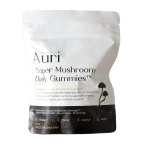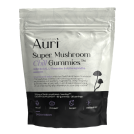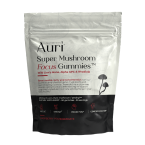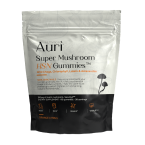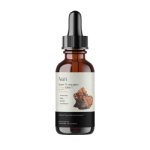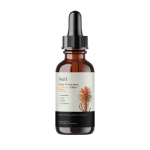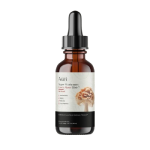3rd party tested
Verified Excellence, Trusted Results
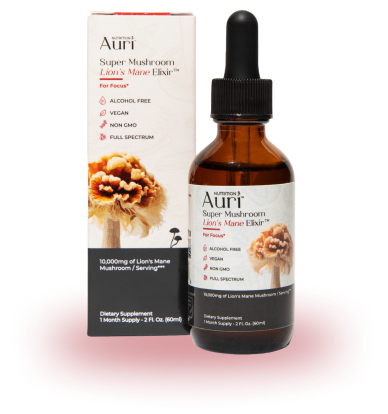
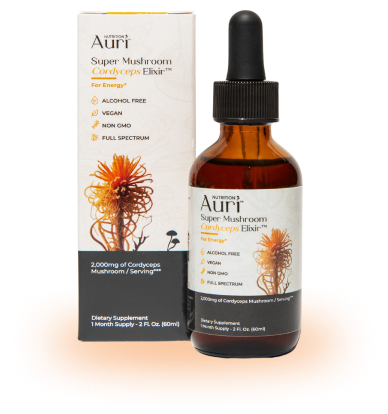

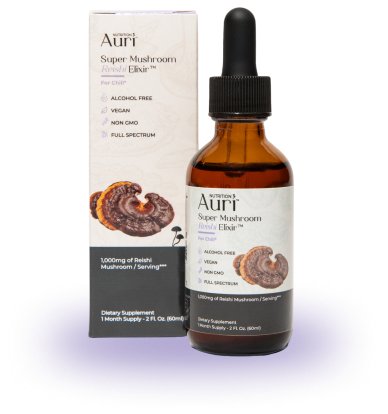
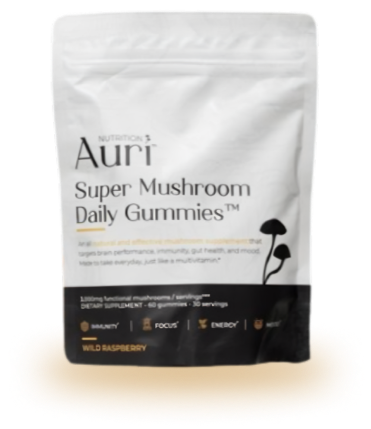
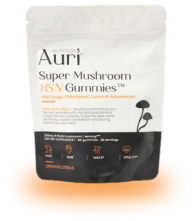

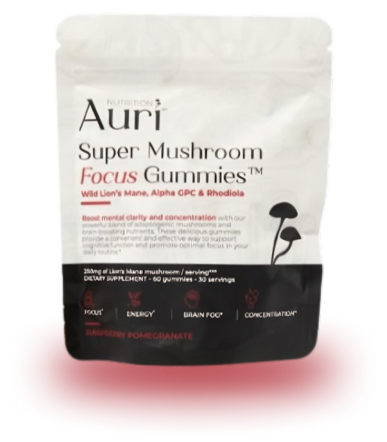
Rigorously lab tested
Guaranteed Purity
Consistent Quality
60 Day Money Back Guarantee


-
NOGMOs, GELATIN, ALCOHOL, FOOD DYES, FILLERS & JUNK
-
YESVEGAN, GLUTEN FREE, TASTES GREAT, REAL MUSHROOMS, LAB TESTED
STRAIGHT FROM MOTHER NATURE
Learn the science after our ingredients based on their benefits
Lion's mane
Details
Lion's Mane mushroom (Hericium erinaceus) is a medicinal fungus highly regarded for its neuroprotective, cognitive-enhancing, and overall health-promoting properties. Traditionally used in Asian medicine, it is now widely studied for its potential to support brain health, reduce symptoms of depression, and provide various other health benefits. The mushroom is rich in bioactive compounds, particularly hericenones and erinacines, which contribute to its therapeutic effects. [1]
Origin
North America, Europe, and Asia
Mechanism of Work
Lion's Mane promotes the synthesis of nerve growth factor (NGF), a protein crucial for the survival, maintenance, and regeneration of neurons. [1] NGF plays a vital role in neurogenesis and the repair of neural damage. The bioactive compounds erinacines and hericenones found in Lion's Mane stimulate NGF production by activating the expression of NGF mRNA in the brain, particularly in hippocampal neurons, which are essential for learning and memory processes.
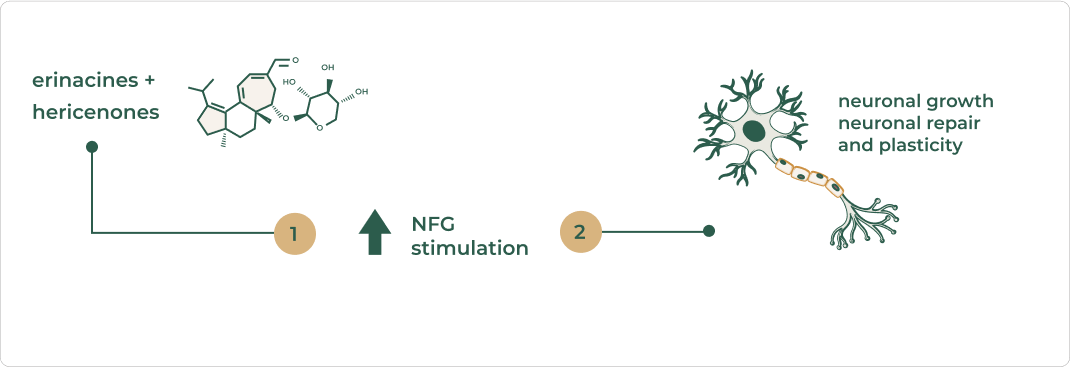
Benefits
Lion's Mane has shown promise in enhancing cognitive function and may help in the prevention of
neurodegenerative diseases like Alzheimer's and Parkinson's. Its bioactive compounds, such as
hericenones and erinacines, can stimulate nerve growth factor (NGF) production, crucial for brain health[1][2].
A pilot study indicated that acute supplementation improved cognitive performance and reduced subjective
stress in young adults[3].
Lion's Mane mushroom also possesses antimicrobial properties, which make it effective in fighting various bacterial infections. Research has shown that extracts of Lion's Mane exhibit significant antibacterial activity against both Gram-positive and Gram-negative bacteria, which are responsible for a wide range of infections. The antimicrobial effects of Lion's Mane are attributed to its bioactive compounds, such as fatty acids, terpenoids, and polysaccharides, which disrupt the bacterial cell membrane and inhibit the growth of pathogens. These findings suggest that Lion's Mane could be used as a natural alternative to conventional antibiotics, particularly in the treatment of antibiotic-resistant bacterial strains. Moreover, its antimicrobial properties also contribute to its potential as a food preservative, extending the shelf life of products by preventing bacterial contamination. [1]
Lion's Mane is believed to exert its mood-stabilizing effects by enhancing the expression of neurotrophic factors, such as NGF and brain-derived neurotrophic factor (BDNF), which are crucial for the growth and maintenance of neurons involved in mood regulation. Additionally, Lion's Mane may influence the hypothalamic-pituitary-adrenal (HPA) axis, a central stress response system that, when dysregulated, can contribute to the development of depression and anxiety. By modulating the HPA axis, Lion's Mane can help reduce stress and improve resilience to psychological stressors. Clinical studies have also indicated that Lion's Mane can alleviate symptoms of depression and anxiety in individuals with mild cognitive impairment, possibly due to its anti-inflammatory and antioxidant properties that help mitigate the impact of chronic stress on the brain. These findings suggest that Lion's Mane could serve as a valuable adjunct therapy for managing depressive disorders and enhancing overall emotional well-being. [2]
Found In
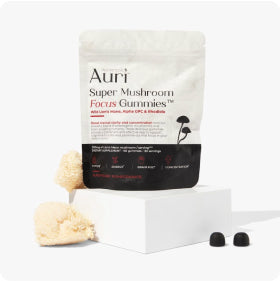
Super Mushroom Focus Gummies™
60 gummies (30 Day Supply)
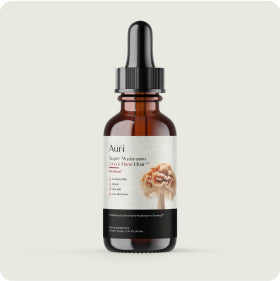
Superpilz-Igelstachelbart-Elixier™
60ml (30 Day Supply)
References
-
[1]
Unlocking the potential of Lion's Mane Mushroom (Hericium erinaceus)
(Banerjee et al., 2024) -
[2]
Therapeutic Potential of Hericium erinaceus for Depressive Disorder
(Chong et al., 2019) -
[3]
Biological activities and chemical profile of Hericium erinaceus mycelium cultivated on mixed red and
white jasmine rice
(Darmasiwi et al., 2022) -
[4]
Prospecting medicinal properties of Lion's mane mushroom
(Ghosh et al., 2021)
Rhodiola
Details
Rhodiola (Rhodiola rosea), also known as golden root or Arctic root, is an adaptogenic herb traditionally used to enhance physical and mental performance, reduce fatigue, and combat stress. Native to the cold mountainous regions of Europe and Asia, Rhodiola has been a staple in traditional medicine for centuries, particularly in Russia and Scandinavia.
Origin
Europe, Asia, and North America
Mechanism of Work
Rhodiola (Rhodiola rosea) exerts its effects primarily through its adaptogenic properties, which help the body resist various physical, chemical, and biological stressors. The active compounds in Rhodiola, including rosavin, salidroside, and tyrosol, play a crucial role in modulating the levels and activity of monoamines like serotonin and dopamine. These neurotransmitters are vital for mood regulation, cognitive function, and overall mental well-being. Additionally, Rhodiola influences the hypothalamic-pituitary-adrenal (HPA) axis, which is central to the body's response to stress. By modulating the HPA axis and reducing cortisol production (the primary stress hormone), Rhodiola enhances resilience to stress, promotes a sense of calm, and boosts cognitive and physical performance.
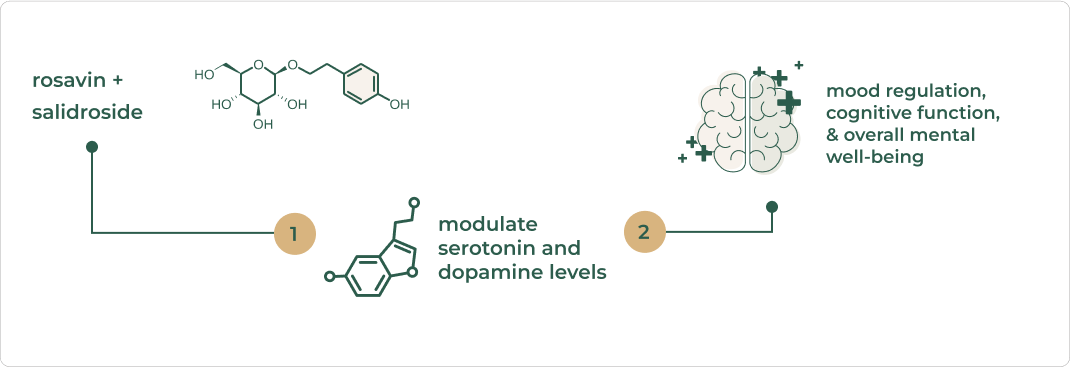
Benefits
Rhodiola is renowned for its ability to help the body adapt to stress by modulating cortisol levels and balancing the HPA axis. This adaptogenic effect reduces feelings of anxiety and promotes a sense of calmness. By decreasing cortisol production, Rhodiola reduces the physiological impact of stress, which is essential for preventing chronic stress-related conditions such as burnout, anxiety disorders, and chronic fatigue syndrome. Research has shown that Rhodiola supplementation significantly lowers stress markers and improves stress resilience in individuals exposed to high-stress environments[1]
Rhodiola enhances cognitive functions such as mental clarity, focus, and memory by increasing the availability of neurotransmitters like serotonin and dopamine in the brain. These neurotransmitters are crucial for maintaining mood, memory, and cognitive performance. Rhodiola's neuroprotective properties also help preserve cognitive function by reducing oxidative stress and inflammation in the brain. Studies have shown that Rhodiola can improve cognitive performance, particularly in situations of mental fatigue or when under stress, making it a valuable supplement for improving mental alertness and productivity[2]
Rhodiola has been shown to alleviate symptoms of depression and anxiety by influencing neurotransmitter activity, particularly serotonin and dopamine, which are critical for mood regulation. By supporting neurogenesis (the growth of new neurons) and reducing the impact of chronic stress on the brain, Rhodiola helps stabilize mood and reduce symptoms of depression. Clinical studies have indicated that Rhodiola can be an effective natural treatment for mild to moderate depression, offering an alternative to conventional antidepressants without the associated side effects [1]
Rhodiola has cardioprotective properties that help protect the heart from stress-induced damage. By reducing the effects of stress on the cardiovascular system, Rhodiola lowers the risk of heart disease, hypertension, and other cardiovascular issues. It improves blood flow and reduces oxidative stress on the heart, which can help prevent heart attacks and strokes. Rhodiola's ability to reduce stress-induced cardiac damage makes it a valuable supplement for individuals at risk of cardiovascular diseases, particularly those under chronic stress [2]
Impact Level of Each Benefit
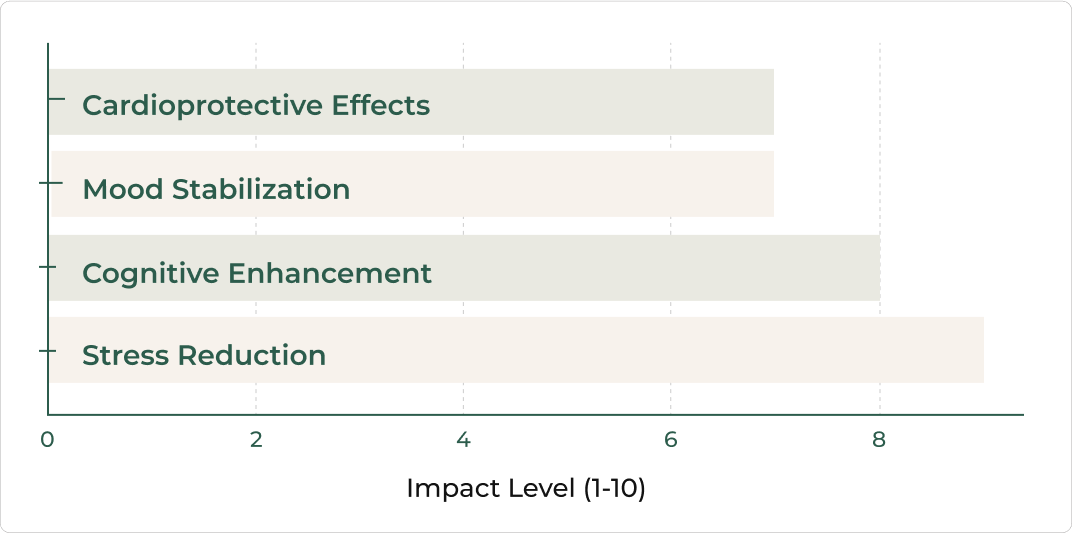
*The information for the graph on the benefits of Rhodiola was derived from the following research papers: [1], [2]
Found In

Super Mushroom Focus Gummies™
60 gummies (30 Day Supply)
References
-
[1]
Rhodiola rosea: a possible plant adaptogen
(Kelly, 2001) -
[2]
Approaches of Rhodiola kirilowii and Rhodiola rosea field cultivation in Poland and their potential
health benefits
(Grech-Baran, 2015)
WILD CHAGA
Details
Wild Chaga (Inonotus obliquus) is a medicinal mushroom found primarily on birch trees in cold climates. Known for its powerful antioxidant properties, Chaga is used to boost immunity, fight inflammation, and support overall health. It has been a part of traditional medicine in Russia and Northern Europe for centuries.
Origin
Russia, Northern Europe, and Canada
Mechanism of Work
Wild Chaga (Inonotus obliquus) exerts its effects through a combination of potent bioactive compounds, including polysaccharides, triterpenoids, melanin, and betulinic acid. These compounds work synergistically to modulate the immune system, providing both immunostimulatory and anti-inflammatory effects. Chaga's high levels of superoxide dismutase (SOD), a powerful antioxidant enzyme, protect cells from oxidative stress by neutralizing free radicals. Additionally, Chaga's triterpenoids and betulinic acid contribute to cellular health by inducing apoptosis in abnormal cells and supporting balanced cell growth. Chaga also supports gastrointestinal health by reducing inflammation in the digestive tract and promoting the balance of gut microbiota (Shashkina et al., 2006).
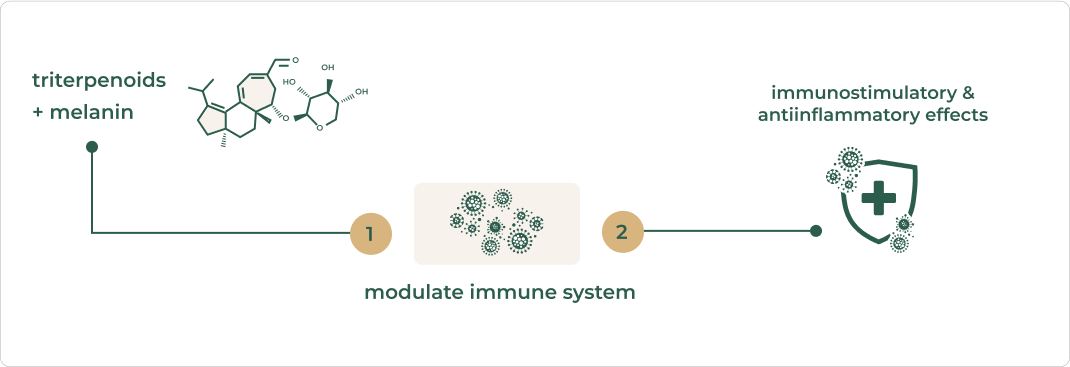
Benefits
Wild Chaga enhances immune function by stimulating the production of cytokines and increasing the activity of natural killer (NK) cells, which play a crucial role in the body's defense against infections. The polysaccharides found in Chaga are particularly effective in boosting the immune response, making it a valuable supplement for those looking to strengthen their immune system and protect against illnesses.[1]
Chaga is one of the most potent natural sources of antioxidants, particularly superoxide dismutase (SOD), which protects cells from oxidative damage caused by free radicals. Oxidative stress is a major contributor to aging and the development of chronic diseases such as cardiovascular diseases and neurodegenerative disorders. By neutralizing free radicals, Chaga helps slow the aging process, supports cellular health, and reduces the risk of chronic disease. [2]
Chaga supports digestive health by reducing inflammation in the gastrointestinal tract and promoting the balance of gut microbiota. It has been shown to be beneficial in managing conditions such as gastritis, ulcers, and irritable bowel syndrome (IBS). Chaga's anti-inflammatory properties help soothe the digestive tract, while its polysaccharides support the growth of beneficial bacteria in the gut, promoting overall digestive wellness. [1]
Found In
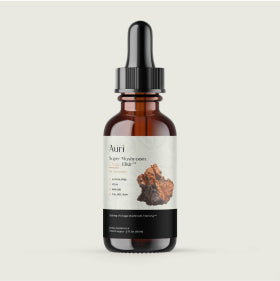
Super-Pilz-Chaga-Elixier™
60ml (30 Day Supply)
References
-
[1]
Chemical and medicobiological properties of chaga
(Shashkina et al., 2006) -
[2]
Recent Developments in Inonotus obliquus (Chaga mushroom) Polysaccharides: Isolation, Structural
Characteristics, Biological Activities and Application
(Yangpeng Lu, 2021) -
[3]
Chemical characterization and biological activity of Chaga (Inonotus obliquus), a medicinal "mushroom"
(J Ethnopharmacol, 2015)
CHLOROPHYL
Details
Chlorophyll is a green pigment found in plants, algae, and cyanobacteria, essential for photosynthesis. It plays a critical role in absorbing light energy, particularly from the sun, which is then converted into chemical energy to fuel plant growth. In humans, chlorophyll is known for its potential health benefits, including detoxification, antioxidant properties, and improving skin health.
Origin
Chloroplasts of plant cells
Mechanism of Work
Chlorophyll works by absorbing light energy, primarily in the blue and red wavelengths, and converting it into chemical energy through the process of photosynthesis. In the human body, chlorophyll's structure is similar to hemoglobin, which allows it to support oxygen transport and improve overall health. It also binds to toxins, aiding in their removal from the body, while its antioxidant properties help neutralize harmful free radicals. Additionally, chlorophyll may reduce inflammation through its ability to inhibit pro-inflammatory cytokines and support tissue regeneration.
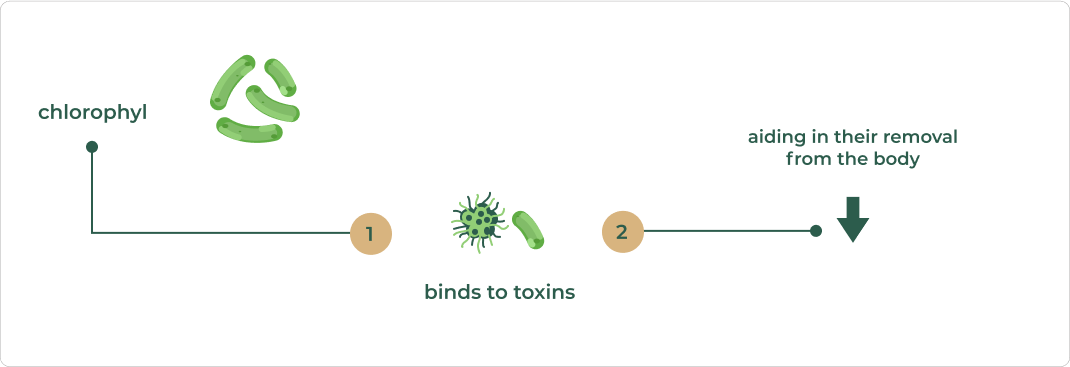
Benefits
Chlorophyll can bind to toxic molecules, such as aflatoxins, and heavy metals, preventing their absorption in the gastrointestinal tract and aiding in their excretion. This property is particularly beneficial for detoxifying the body and reducing the risk of carcinogenesis [1], [2]
Chlorophyll may reduce inflammation by inhibiting the production of pro-inflammatory cytokines. Chronic inflammation is a contributing factor to many diseases, including cardiovascular diseases, diabetes. [3]
Chlorophyll acts as an antioxidant, neutralizing free radicals in the body. This antioxidant activity helps protect cells from oxidative damage, which is linked to aging and various chronic diseases.[3]
Found In
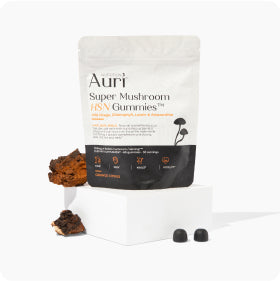
Super Mushroom HSN Gummies (Haare, Haut, Nägel)™
60 gummies (30 Day Supply)
References
-
[1]
Chlorophyllin intervention reduces aflatoxin-DNA adducts in individuals at high risk for liver disease.
(Egner, P. A., et al, 2001) -
[2]
Chlorophyllin chemoprevention in rats exposed to dietary aflatoxin B1.
(Breinholt, V., et al. 1995) -
[3]
Chlorophyll as a source of bioactive compounds in the diet.
(J Ethnopharmacol, 2015) -
[4]
Assessment of the safety and efficacy of topical copper chlorophyllin in women with photodamaged facial
skin
(Monya L Sigler, 2015)
Wild Reishi
Details
Wild Reishi (Ganoderma lucidum), also known as Lingzhi, is a type of medicinal mushroom that has been used in traditional Chinese medicine for over 2,000 years. Renowned for its potential health benefits, Reishi is valued for its immune-modulating, anti-inflammatory, and antioxidant properties. This mushroom is often called the "mushroom of immortality" due to its historical association with longevity and health.
Origin
China, Japan, and Korea
Mechanism of Work
Wild Reishi exerts its effects through its rich composition of bioactive compounds, including triterpenoids, polysaccharides, and peptidoglycans. These compounds modulate the immune system by enhancing the activity of white blood cells, particularly macrophages and natural killer (NK) cells, which help the body fight infections and potentially reduce tumor growth. Reishi also exerts anti-inflammatory effects by inhibiting pro-inflammatory cytokines, which helps manage chronic inflammation and autoimmune conditions. Additionally, its antioxidant properties protect cells from oxidative stress, thereby promoting longevity and reducing the risk of chronic diseases like cardiovascular disease.
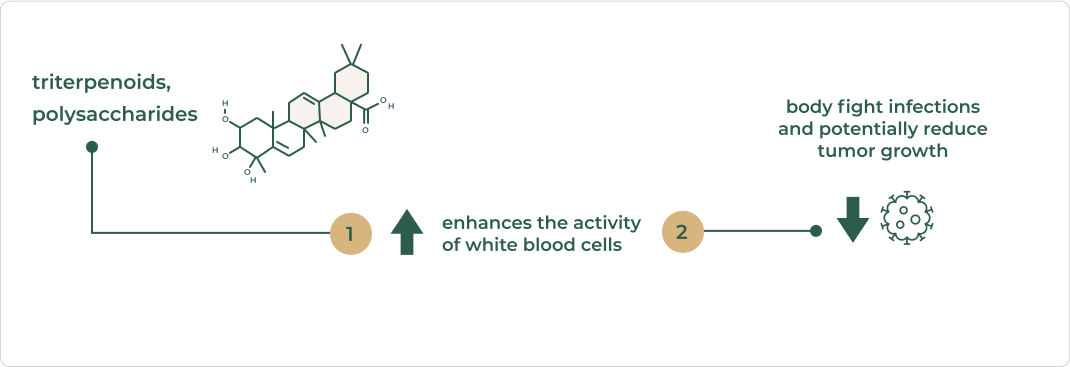
Benefits
Wild Reishi is known for its ability to modulate the immune system, either enhancing or calming immune responses as needed. It helps to increase the activity of white blood cells, particularly natural killer (NK) cells, which are crucial in protecting the body against infections. Reishi's polysaccharides, especially beta-glucans, are the primary compounds responsible for this immune-modulating effect. [1]
Reishi mushrooms are rich in antioxidants, particularly triterpenes and polysaccharides, which help neutralize harmful free radicals in the body. This antioxidant activity can reduce oxidative stress, protect against cellular damage, and may contribute to the prevention of chronic diseases such as cardiovascular disease.[2]
Reishi has hepatoprotective effects, meaning it can help protect the liver from damage caused by toxins, infections, and other harmful substances. The triterpenes in Reishi have been shown to enhance liver function, support detoxification processes, and potentially prevent liver diseases such as hepatitis and cirrhosis.[3]
Reishi is traditionally used to promote relaxation, reduce stress, and improve sleep quality. The mushroom’s compounds may help balance neurotransmitters in the brain, such as serotonin and dopamine, leading to reduced anxiety, better mood regulation, and enhanced sleep.[4]
Impact Level of Each Benefit
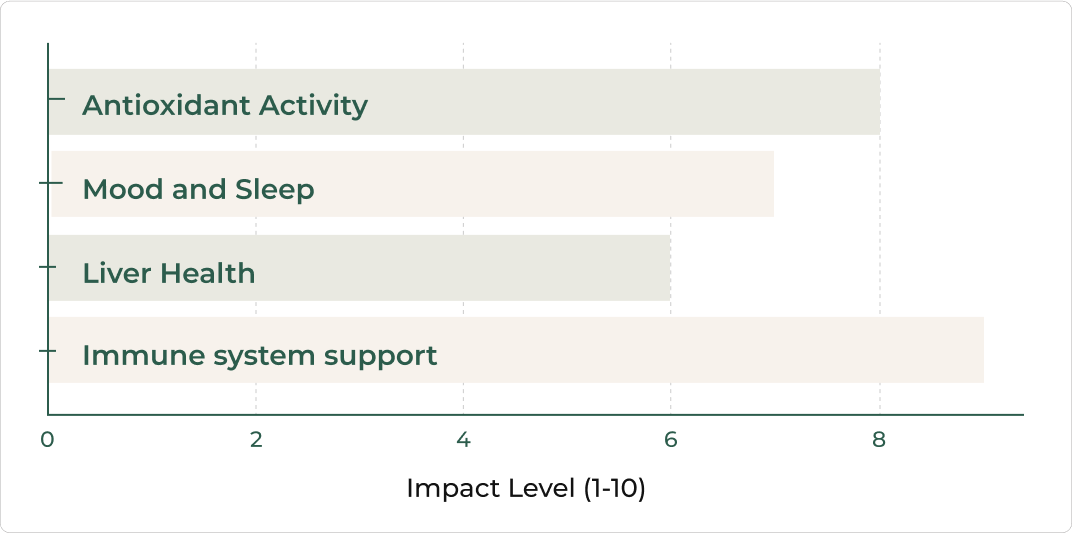
*The information for the graph on the benefits of Wild Reishi was derived from the following research papers: [1], [2], [3], [4]
Found In
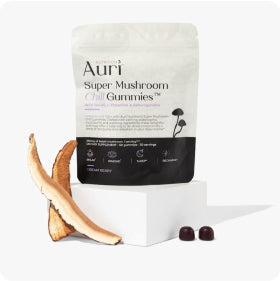
Super Mushroom Chill Gummies™
60 gummies (30 Day Supply)
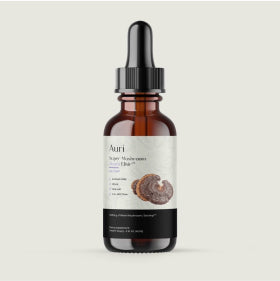
Super Mushroom Reishi Elixir™
60ml (30 Day Supply)
References
-
[1]
The anti-tumor effect of Ganoderma lucidum is mediated by cytokines released from activated macrophages
and T lymphocytes
(Boh, B., et al. (2007)) -
[2]
Anti-tumor and immunoregulatory activities of Ganoderma lucidum and its possible mechanisms
(Lin, Z. B., & Zhang, H. N. (2004)) -
[3]
Liver protective activities of triterpenes from Ganoderma lucidum.
(Zhu, H., et al. (2000)) -
[4]
Reishi mushroom (Ganoderma lucidum) improves mood state and sleep quality in healthy volunteers.
(Zhu, H., et al. (2000))
Ashwagandha
Details
Ashwagandha (Withania somnifera), often called Indian ginseng, is an adaptogenic herb revered in Ayurvedic medicine for its ability to reduce stress, enhance cognitive function, and boost overall vitality. It is known for promoting mental clarity, physical stamina, and resilience against stress.
Origin
India, North Africa, and the Middle East
Mechanism of Work
Ashwagandha's effects are primarily due to its active compounds, such as withanolides, alkaloids, and saponins. These compounds modulate the hypothalamic-pituitary-adrenal (HPA) axis, reducing cortisol production, which is the body's main stress hormone. Lower cortisol levels help diminish the physiological effects of stress, such as anxiety, fatigue, and cognitive impairment. Additionally, Ashwagandha has neuroprotective properties that promote neurogenesis and enhance synaptic plasticity, improving learning and memory. It also exhibits anti-inflammatory and antioxidant properties, contributing to its overall health benefits [1]
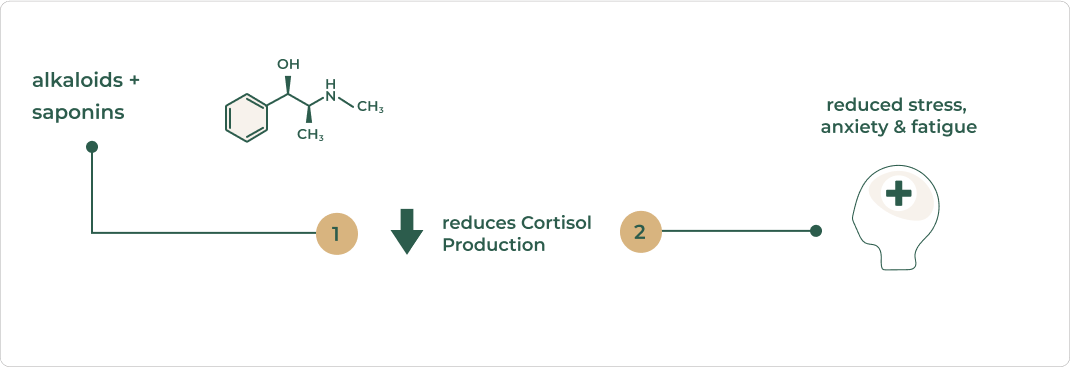
Benefits
Ashwagandha is highly effective in reducing stress and anxiety by lowering cortisol levels and balancing the HPA axis. Chronic stress can lead to various health issues, including anxiety disorders, depression, and chronic fatigue. Ashwagandha mitigates these effects by modulating the body's stress response, promoting a sense of calm and well-being. Clinical studies have demonstrated significant reductions in cortisol levels and improvements in anxiety symptoms with Ashwagandha supplementation[2].
Ashwagandha enhances cognitive function by improving memory, attention, and learning abilities. Its neuroprotective effects are attributed to its ability to promote neurogenesis and protect against neurodegeneration. Studies show that Ashwagandha improves cognitive performance in both healthy individuals and those with cognitive impairments like Alzheimer's disease. By enhancing synaptic plasticity and reducing oxidative stress in the brain, Ashwagandha supports long-term cognitive health[1]
Ashwagandha helps balance hormone levels, particularly in women. It has been shown to alleviate symptoms of menopause, such as hot flashes, mood swings, and sleep disturbances, by modulating the endocrine system. Additionally, Ashwagandha may support reproductive health by increasing testosterone levels and improving sperm quality in men [3].
The herb has potent anti-inflammatory properties, which help manage chronic inflammatory conditions such as arthritis, asthma, and inflammatory bowel disease. Ashwagandha's withanolides inhibit pro-inflammatory cytokines, reducing inflammation and alleviating related symptoms.[4].
Impact Level of Each Benefit
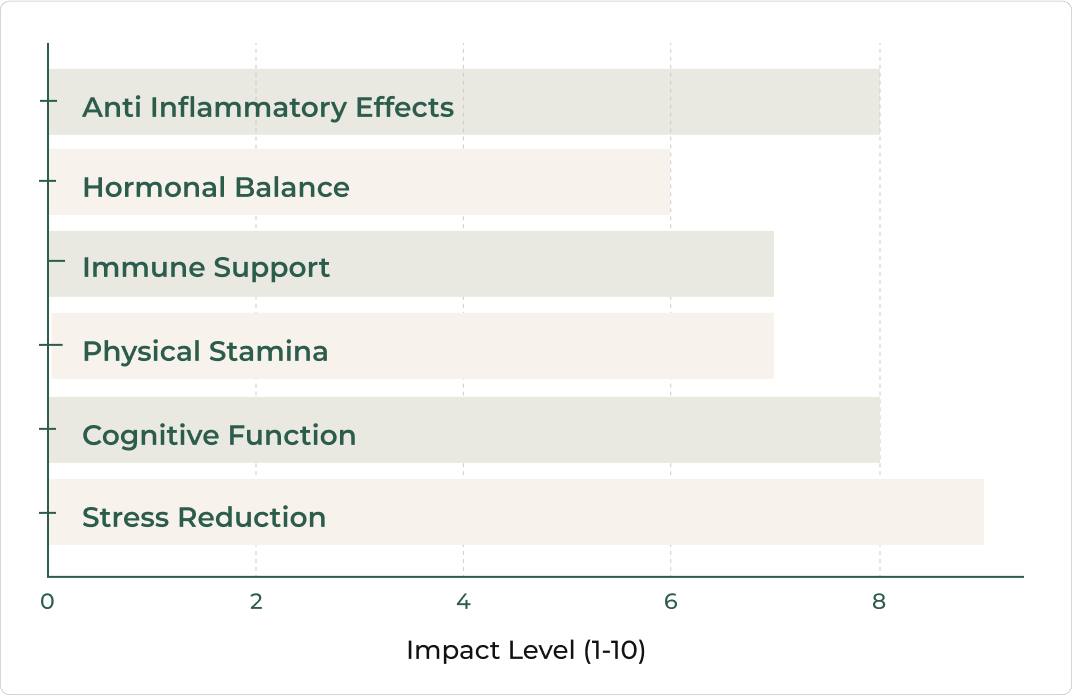
*The information for the graph on the benefits of Ashwagandha was derived from the following research papers: [1], [2], [3], [4]
Found In

Super Mushroom Chill Gummies™
60 gummies (30 Day Supply)
References
-
[1]
An Overview on Ashwagandha
(Singh et al., 2011) -
[2]
A prospective, randomized double-blind, placebo-controlled study of safety and efficacy of a
high-concentration full-spectrum extract of ashwagandha root in reducing stress and anxiety in adults
(Chandrasekhar et al., 2012) -
[3]
Withania somnifera (Ashwagandha) in neurobehavioural disorders induced by brain oxidative stress in
rodents: a systematic review and meta-analysis
(Durg et al., 2015) -
[4]
Scientific basis for the therapeutic use of Withania somnifera (ashwagandha)
(Mishra et al., 2000)
L-THEANINE
Details
L-Theanine is an amino acid primarily found in green tea leaves (Camellia sinensis) and certain types of mushrooms. It is known for its calming effects, promoting relaxation without sedation, and is often used to reduce stress and improve mental focus. L-Theanine is popular as a dietary supplement due to its potential cognitive and mood-enhancing benefits.
Origin
East Asia
Mechanism of Work
L-Theanine crosses the blood-brain barrier and primarily influences the brain by increasing the production
of neurotransmitters like gamma-aminobutyric acid (GABA), serotonin, and dopamine. These neurotransmitters
are crucial in regulating mood, attention, and alertness. L-Theanine also enhances alpha brain wave
activity, associated with a state of relaxed wakefulness, promoting relaxation without drowsiness.
By modulating these neurotransmitters and brain wave patterns, L-Theanine can reduce stress, improve
cognitive function, and enhance attention and focus. It also has neuroprotective effects, potentially aiding
in the prevention of neurodegenerative diseases.
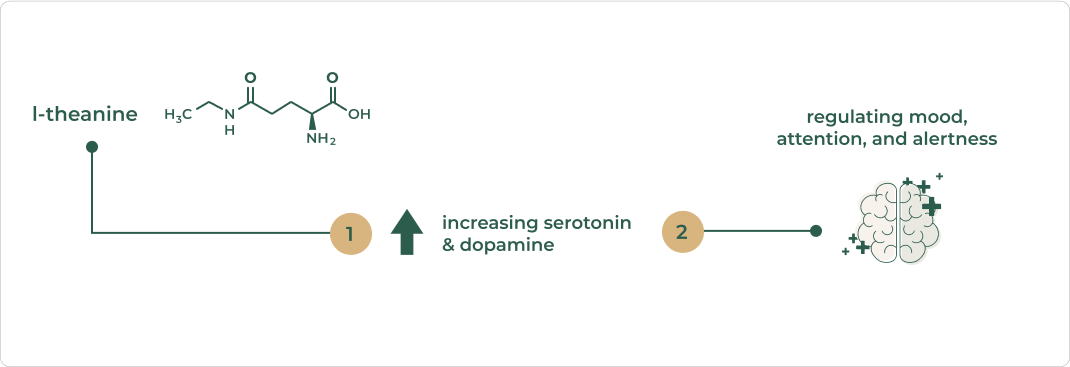
Benefits
L-Theanine is most well-known for its ability to reduce stress and promote relaxation without causing drowsiness. It increases alpha brain wave activity, which is associated with a relaxed, yet alert mental state. This makes L-Theanine particularly beneficial for managing anxiety and improving mood during stressful situations. [1]
L-Theanine has been shown to enhance cognitive function, particularly attention and focus. It can improve mental clarity and cognitive performance, especially when combined with caffeine, which is also found in tea. This combination leads to increased alertness and faster reaction times without the jittery effects of caffeine alone. [2]
Although L-Theanine does not cause drowsiness, it can improve sleep quality by promoting relaxation and reducing anxiety, making it easier to fall asleep. This benefit is particularly useful for individuals who experience stress-related sleep disturbances. [3]
L-Theanine has antioxidant properties, which help protect the brain from oxidative stress. This contributes to its neuroprotective effects, potentially reducing the risk of neurodegenerative diseases like Alzheimer's and Parkinson's. L-Theanine's ability to modulate neurotransmitter levels and reduce oxidative damage makes it a promising compound for maintaining cognitive health as one ages. [3]
Impact Level of Each Benefit

*The information for the graph on the benefits of cordyceps was derived from the following research papers: [1], [2], [3], [4]
Found In

Super Mushroom Chill Gummies™
60 gummies (30 Day Supply)
References
-
[1]
L-theanine, a natural constituent in tea, and its effect on mental state.
(Nobre, A. C., et al. (2008)) -
[2]
The combined effects of L-theanine and caffeine on cognitive performance and mood.
(Haskell, C. F., et al. (2008)) -
[3]
L-theanine reduces psychological and physiological stress responses." Biological Psychology
(Kimura, K., et al. (2007))
Cordyceps
Details
Cordyceps is a genus of parasitic fungi that includes species like Cordyceps sinensis and Cordyceps militaris, widely used in traditional Chinese medicine. Known for its energy-boosting, anti-aging, and immune-enhancing properties, Cordyceps has gained popularity as a natural supplement. It is believed to improve athletic performance, enhance stamina, and support overall health.
Origin
Tibet, Bhutan, and Nepal
Mechanism of Work
Cordyceps exerts its effects through several mechanisms, primarily involving its active compounds, such as cordycepin, adenosine, and polysaccharides. These compounds contribute to its energy-enhancing, immune-modulating, and anti-inflammatory properties. Cordyceps improves cellular energy production by increasing ATP (adenosine triphosphate) levels, which boosts physical performance and reduces fatigue. It also modulates the immune system by enhancing the activity of natural killer (NK) cells and other immune responses, making the body more resilient to infections and diseases. Furthermore, Cordyceps has antioxidant properties that help protect cells from oxidative damage, and it may improve respiratory function by increasing oxygen utilization.
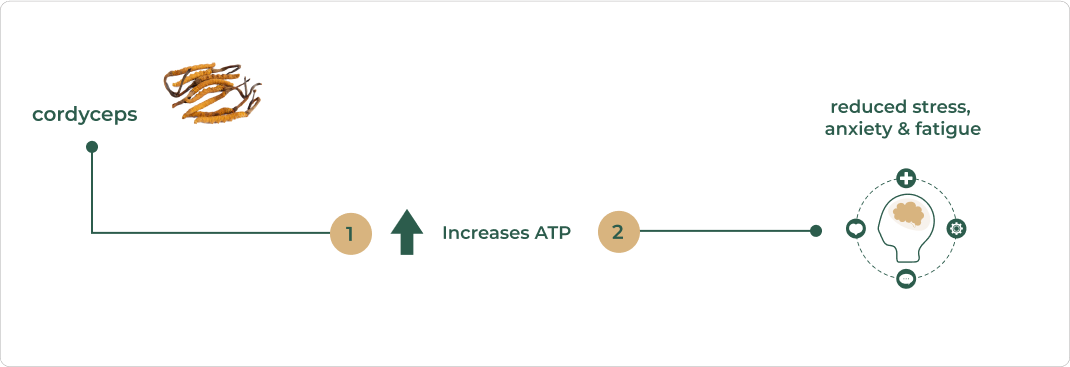
Benefits
Cordyceps is renowned for its ability to boost energy and enhance athletic performance. This is largely due to its capacity to increase ATP production, the primary energy carrier in cells. By enhancing mitochondrial function, Cordyceps can help reduce fatigue, improve endurance, and support recovery in athletes and physically active individuals. [1]
Cordyceps has been traditionally used to support respiratory health, particularly in cases of chronic bronchitis and asthma. It is believed to improve oxygen utilization and enhance lung function, making it beneficial for individuals with respiratory conditions or those living at high altitudes. [2]
Cordyceps is often associated with anti-aging and longevity, primarily due to its antioxidant properties and ability to protect against oxidative stress. It is believed to help maintain youthful energy levels, improve memory and cognitive function, and promote overall vitality as people age. [3].
Cordyceps may support cardiovascular health by improving blood circulation, lowering blood pressure, and reducing cholesterol levels. Its ability to enhance the bioavailability of oxygen in the bloodstream contributes to overall heart health and may reduce the risk of cardiovascular diseases. [4].
Impact Level of Each Benefit

*The information for the graph on the benefits of cordyceps was derived from the following research papers: [1], [2], [3], [4]
Found In
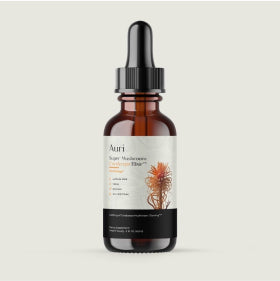
Super Mushroom Cordyceps Elixir™
60ml (30 Day Supply)
References
-
[1]
Cordyceps militaris improves tolerance to high intensity exercise after acute and chronic
supplementation
(Chen, S., et al. (2010)) -
[2]
Cordyceps sinensis improves the clinical symptoms and quality of life in patients with
moderate-to-severe asthma.
(Ning, W., et al. (2014)) -
[3]
Antiaging effect of Cordyceps sinensis extract.
(Ji, D. B., et al. (2009)) -
[3]
Recent advances in Cordyceps sinensis polysaccharides: Mycelial fermentation, isolation, structure, and
bioactivities
(Jing-Kun Yan, 2014)


OUR PROMISE
Feels (and tastes like) magic.
Crafted carfully with premium ingredients
Rigorously lab tested



